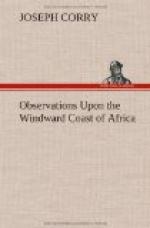The palm tree, producing the oil so denominated, is one of the most useful trees to the African, yielding him meat, drink, and raiment. Where it grows, it is an indication of a good soil. It is remarkably tall, without branches, having regular and gradual protuberances, from the bottom towards the top, ending in five or six clusters of nuts, shaded by large deciduous leaves. The nuts, which are about the size of a hazle nut, have a hard kernel, encompassed by a clammy unctuous substance, covered by a thin skin, and the oil is produced from them by being exposed to the sun, which, by its influence, opens the juices; subsequent to this exposure, the nuts are put into a boiler full of water, and a liquid, in the process of boiling, flows upon the top, which when skimmed off, soon hardens and turns rancid; the kernel of the nut, after this process, is taken out of the boiler, beat in a paloon, and put into clear water, the shell of the nut sinks, and its contents float upon the surface, which, when skimmed as before, is finally put into a pot, fried, and carefully poured off, producing another kind of oil, used as butter, and having in a great degree its quality.
The wine is extracted from the tree by forming an incision at the bottom of every cluster of nuts, from each of which flows about a gallon of wine per day, for a week, when they are closed until the ensuing season. The liquid, when newly taken from the tree, resembles whey, and in that state has a sweetish agreeable taste, but it soon ferments and grows sour, changing to a strong vinegar of a disagreeable smell: in its fermented state it is most esteemed by the natives, and is productive of inebriety.
A substance overtops the clusters about 10 or 12 inches in diameter, and 3 or 4 feet in height, in a full grown tree, from whence proceeds a stalk, about 4 inches in length, which, on being boiled in water, makes an excellent vegetable resembling cabbage, or rather, in taste, the cauliflower; the leaves of the tree are converted by the natives into baskets, fishing nets, and cloth.
MEDICINAL PLANTS. Colla is highly esteemed by the natives, and they attribute to it the virtues of Peruvian bark; the Portuguese, ascribe the same quality to it, and dispatch from their factories small vessels to collect all they can procure.
Castor Oil Rhinum.-The bush which produces the bud from which this oil and valuable medicine is extracted, grows in great exuberance upon the Windward Coast, and its vicinity. A species of bark is in great abundance also, and is said to be equal in virtue to the Peruvian.
The foregoing enumeration of natural productions, is the result of unscientific enquiry only; but unquestionably, industrious and professional research, would discover infinitely more to philosophic and commercial contemplation, and develope the arcana of nature, dormant here through ignorance and barbarism.
On the 10th of May, I set out from Bance Island, with the view of exploring the two branches of the Sierra Leone river, the Rochelle, and the Port Logo. After rowing a few hours I arrived at the factory of Miffare, formerly occupied by a Mr. Berauld, a Frenchman, but now attached to Bance Island.




